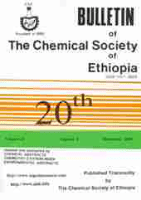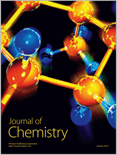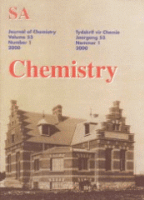
Moroccan Journal of Chemistry
Scope & Guideline
Uniting Global Scholars for a Deeper Understanding of Chemistry.
Introduction
Aims and Scopes
- Medicinal Chemistry:
The journal publishes studies on the synthesis and biological evaluation of medicinal compounds, including their pharmacological activities, molecular docking studies, and development of new drug candidates. - Materials Science:
Research on the synthesis, characterization, and application of advanced materials, including nanomaterials and composites, with a focus on their properties and performance in various applications. - Corrosion Science:
The journal features studies investigating the mechanisms of corrosion, the development of corrosion inhibitors, and the application of natural extracts as green corrosion inhibitors in various environments. - Environmental Chemistry:
Papers addressing the chemical aspects of environmental issues, including the study of pollutants, their removal methods, and the development of sustainable materials for environmental remediation. - Analytical Chemistry:
Research involving the development and application of analytical techniques for the detection and quantification of chemical substances in various matrices, including environmental samples. - Computational Chemistry:
Studies utilizing computational methods to predict chemical behavior, molecular interactions, and the design of new compounds, including QSAR and molecular dynamics simulations.
Trending and Emerging
- Green Chemistry and Sustainable Practices:
There is a growing emphasis on green chemistry, focusing on sustainable synthesis, waste reduction, and environmentally friendly processes, as seen in studies utilizing natural extracts for various applications. - Nanotechnology:
Research on nanomaterials and their applications in drug delivery, environmental remediation, and materials science is trending, highlighting the innovative potential of nanoscale systems. - Biological Activity of Natural Products:
An increase in studies exploring the pharmacological potential of natural compounds and extracts, particularly in the context of antimicrobial, anti-inflammatory, and anticancer activities, indicates a rising interest in traditional medicine. - Computational Drug Design:
The use of computational methods for drug design and molecular modeling is becoming more prevalent, showcasing the integration of theoretical and experimental approaches to accelerate drug discovery. - Interdisciplinary Approaches:
Research that combines chemistry with other disciplines, such as biology, environmental science, and materials engineering, is on the rise, reflecting the journal's commitment to multidisciplinary research.
Declining or Waning
- Traditional Synthetic Methods:
There has been a noticeable decrease in articles focusing on conventional synthetic methods, as more researchers are shifting towards greener and more sustainable approaches in chemical synthesis. - Basic Theoretical Studies:
Research purely focusing on theoretical aspects without practical applications appears to be waning, as the journal increasingly emphasizes studies that demonstrate real-world applications of theoretical findings. - General Chemistry Education:
Papers that solely address general chemistry education without a strong link to current research trends or applications are less frequent, as the journal seeks to publish more innovative and impactful educational methodologies.
Similar Journals

JOURNAL OF THE INDIAN CHEMICAL SOCIETY
Advancing Chemical Knowledge from India to the WorldJournal of the Indian Chemical Society, published by Elsevier, stands as a cornerstone in the field of chemistry, particularly representing the rich chemical research emanating from India.
With a significant history dating back to its establishment, this journal encompasses diverse disciplines including Drug Discovery, Electrochemistry, Inorganic Chemistry, Organic Chemistry, and Physical and Theoretical Chemistry, reflecting the evolving landscape of chemical sciences.
Despite being positioned in the Q3 category across multiple quarters, the journal demonstrates promising rankings in various chemistries, highlighting its commitment to advancing the knowledge and application of chemical sciences. While currently not available as an open access journal, the Journal of the Indian Chemical Society is dedicated to providing a platform for high-quality research that fosters innovation and collaboration among researchers, professionals, and students worldwide.
With its continuous publication from 1973 to the present, it serves as an essential repository for cutting-edge findings and developments in chemistry, striving to connect academia with industry and practice.

BULLETIN OF THE CHEMICAL SOCIETY OF ETHIOPIA
Advancing Chemistry through Open Access InnovationBULLETIN OF THE CHEMICAL SOCIETY OF ETHIOPIA (ISSN: 1011-3924; E-ISSN: 1726-801X), published by the Chemical Society of Ethiopia, serves as a pivotal platform for the dissemination of innovative research and developments within the field of chemistry. Since its inception in 1996 and now an open access journal since 2012, it has provided researchers, academics, and students with unrestricted access to critical studies and findings, thus fostering collaboration and the advancement of knowledge in the discipline. The journal's current standing in the Q3 quartile in the 2023 Chemistry category underlines its commitment to maintaining high academic standards, while its Scopus ranking, positioned at #250 out of 408 in general chemistry, showcases its growing influence and contribution to the scientific community. Hailing from Ethiopia and targeted toward a global readership, the journal aims to highlight local and international research, engaging scholars and practitioners alike in discussions that propel the science of chemistry forward.

Journal of Chemistry
Shaping the Future of Chemical ScienceJournal of Chemistry, published by Hindawi Ltd, serves as a critical platform for advancing knowledge in the field of chemistry, particularly in its miscellaneous sub-disciplines. With an impressive 2023 Scopus Rank of #123 out of 408 and positioned in the Q2 quartile, this journal exemplifies a robust academic rigor that appeals to researchers, professionals, and students alike. It features articles related to innovative chemical research and developments, catering to a diverse audience eager to contribute to the growing body of literature in the chemical sciences. The journal has been operational from 2013 to 2024, and its Open Access model ensures that findings are easily accessible to a global audience, fostering collaboration and knowledge sharing. With a commitment to quality and relevance, the Journal of Chemistry continues to play a significant role in shaping contemporary chemical research and education.

Macedonian Journal of Chemistry and Chemical engineering
Advancing the Frontiers of Chemistry and Chemical EngineeringMacedonian Journal of Chemistry and Chemical Engineering, published by the SOC CHEMISTS TECHNOLOGISTS MACEDONIA, is a premier Open Access journal established in 2008, with a focus on disseminating innovative research in the fields of Chemistry and Chemical Engineering. With its ISSN 1857-5552 and E-ISSN 1857-5625, the journal has rapidly gained recognition, achieving a Q3 category rank in both Chemical Engineering and Chemistry for 2023, reflecting its contribution to academic debate and practical advancements within these disciplines. The journal is dedicated to fostering an accessible platform for researchers, practitioners, and students, allowing them to share their findings and insights with a global audience. Situated in Skopje, Macedonia, the journal welcomes submissions that explore a wide array of topics, including but not limited to, theoretical models, experimental studies, and technological innovations. Since transitioning to an Open Access model in 2014, the journal has enhanced its reach and impact, providing unrestricted access to all published articles, thereby encouraging collaboration and knowledge sharing across the scientific community.

Ovidius University Annals of Chemistry
Empowering Chemical Sciences Through Open Access.Ovidius University Annals of Chemistry is a prominent open-access journal dedicated to the field of chemistry and chemical engineering, published by OVIDIUS UNIV PRESS since 2012. With its ISSN 1583-2430 and E-ISSN 2286-038X, this journal seeks to foster innovative research and disseminate knowledge across diverse chemical disciplines. Situated in the vibrant academic setting of Ovidius University in Constanta, Romania, this journal receives contributions from a global pool of researchers, enhancing its relevance in the international scientific community. The open-access format ensures that all published articles are freely available, promoting a wider reach and impact of the research dissemination. As a valued resource for academics, industry professionals, and students alike, the Ovidius University Annals of Chemistry plays a crucial role in advancing the understanding of chemical sciences and engineering practices.

Journal of the Iranian Chemical Society
Unveiling the Future of Chemistry, One Study at a TimeThe Journal of the Iranian Chemical Society, published by SPRINGER, is a prominent academic journal dedicated to advancing the field of chemistry. With an ISSN of 1735-207X and an E-ISSN of 1735-2428, this quarterly journal has been contributing valuable research from 2006 to 2024. Situated in Germany, it serves as a vital platform for chemists and researchers to disseminate their findings, particularly within the miscellaneous chemistry category, where it ranks in the Q3 quartile for 2023. Despite its current lack of open access options, the journal maintains a solid presence in the academic community, evidenced by its Scopus ranking of #165 out of 408 in general chemistry and a commendable 59th percentile. The journal's objective aims to foster innovation and collaboration in chemical research, making it an essential resource for professionals and students keen on pioneering developments in the field. As a subscriber, you will gain insights into cutting-edge research that drives the future of chemistry.

SOUTH AFRICAN JOURNAL OF CHEMISTRY-SUID-AFRIKAANSE TYDSKRIF VIR CHEMIE
Connecting Researchers, Inspiring DiscoveriesSouth African Journal of Chemistry (Suid-Afrikaanse Tydskrif vir Chemie), published by Bureau Scientific Publications, is a pivotal open-access journal that has been disseminating groundbreaking research in the field of chemistry since its inception in 1996. With an ISSN of 0379-4350 and an E-ISSN of 1996-840X, this journal serves as a vital platform for researchers and professionals seeking to share their work and engage with the global chemistry community. Recognized for its significant contributions, the journal holds a Q3 quartile ranking in the miscellaneous chemistry category as of 2023 and ranks #216 out of 408 in General Chemistry according to Scopus. The South African Journal of Chemistry is dedicated to advancing knowledge in the discipline by publishing a wide array of articles, reviews, and studies that address pertinent chemical research and applications. With open access options available since 2000, it fosters a collaborative environment, ensuring that research is accessible to all, thereby enhancing the visibility and impact of chemists' work across South Africa and beyond.

Chemical Methodologies
Fostering Collaboration for Chemical InnovationWelcome to Chemical Methodologies, a premier journal published by SAMI PUBLISHING CO-SPC, dedicated to advancing the field of chemistry through innovative research and methodologies. With an ISSN of 2645-7776 and an E-ISSN of 2588-4344, this journal provides a vital platform for researchers and scholars to share their findings in areas encompassing physical, theoretical, and organic chemistry. Despite its initial HIndex and quartile rankings still being established, the journal's evolving impact within the academic landscape is underscored by its Scopus Ranks, which place it in the 35th percentile for physical and theoretical chemistry and the 33rd percentile for organic chemistry. Since its inception in 2022, and continuing through 2024, Chemical Methodologies aims to foster collaboration and knowledge dissemination among academics and practitioners alike, bridging theoretical concepts and practical applications. This open-access platform enhances accessibility for researchers and students worldwide, ensuring that groundbreaking contributions to chemical science reach a broad audience.

Canadian Journal of Chemistry
Uniting Scholars for a Brighter Chemical FutureWelcome to the Canadian Journal of Chemistry, a prominent publication dedicated to advancing the study of chemistry through original research and critical reviews. Published by Canadian Science Publishing, this journal has been a cornerstone of chemical research since its inception, covering a broad spectrum of topics within the field, including catalysis, organic chemistry, and general chemistry. With an ISSN of 0008-4042 and E-ISSN of 1480-3291, it provides a vital platform for researchers, professionals, and students to disseminate their findings and engage in scholarly discourse. Impact Factor is currently in development, with the journal classified in the Q4 category for catalysis and Q3 for miscellaneous chemistry fields, signifying its evolving contributions to the scientific community. The journal operates without an open access model, which ensures a rigorous peer-review process while maintaining subscription access for institutions and libraries. Located in Ottawa, Canada, the Canadian Journal of Chemistry continues to provide an invaluable resource for those dedicated to the scientific pursuit of chemistry, making significant strides in fostering interdisciplinary approaches and innovative research methodologies.

REVUE ROUMAINE DE CHIMIE
Catalyzing Innovation in the Realm of ChemistryREVUE ROUMAINE DE CHIMIE is a distinguished academic journal in the field of chemistry, published by EDITURA ACAD ROMANE in Romania. With an ISSN of 0035-3930, this journal has been a valuable platform for disseminating original research and insights in the diverse realm of chemistry since its inception. The journal currently operates under a competitive tier, categorized in Q4 for miscellaneous chemistry fields, as reflected in its Scopus ranking of #348 out of 408, placing it within the 14th percentile. Aiming to foster scientific discourse and innovation, the REVUE ROUMAINE DE CHIMIE provides a repository of knowledge that is crucial for researchers, professionals, and students eager to advance their understanding and contribute to the global chemistry community. By bridging local and international research initiatives, this journal plays an essential role in enhancing the visibility of Romanian scientific contributions on the world stage.